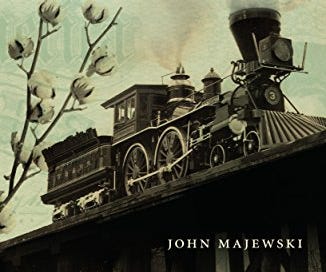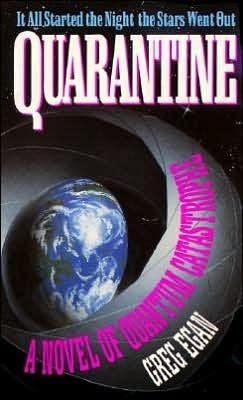Modernizing a Slave Economy: The Economic Vision of the Confederate Nation, by John Majewski (256 pp; 2009)
Who should read this? People who're fascinated by behind-the-scenes details and trends of American history.
This book is really two essays jammed together and interwoven. There're definitely common threads, but Majewski (to his credit) isn't attempting a full history of the Southern economy, so the two topics he does dig into still feel like they should be separate essays. In each of the would-be essays, he digs in, spells out how his conclusions are contrary to the prevailing view, and then... leaves things there without exploring the implications.
In the first sort-of-essay, Majewski points out that Southern soil is lower quality than most other places in America: more acidic and less nutrient-full. Because of this, most Southern farmers (including planters) practiced "shifting cultivation": basically, slash-and-burn agriculture, moving from quarter to quarter of their plantation every eight years or so as that quarter got exhausted. So, about three-fourths of the land was basically unpopulated forested waste. This lower population density hurt transportation and the growth of cities and industrial development by diminishing market size. Northern contemporaries attributed all these negative trends to slavery, and that didn't help, but the poor-quality soil was behind a large part of it. Majewski goes through these contemporary analyses, and Southerners' responses, and points out how both sides overlooked the role of the soil.
In the second sort-of-essay, Majewski lists out how many Southern leaders - especially secessionists - wanted industrial development, and expected Southern independence to help it because they attributed this backwardness to Northern economic dominence over the South. The South did glorify the owning of land, but that wasn't their sole view of life or economy. Unfortunately, Majewski doesn't try to integrate the quotes he draws out with this widespread pro-agrarian sentiment I've read from other sources.
The writing was flawed, and the interaction with other elements of history could have also been improved. But, I loved this book anyway because of these eyeopening, mindbending points.
The Perfectionists, by Simon Winchester (401 pp, 2018)
Who should read this? People who want to trace a background trend through modern industrial development.
How can jet engines' turbine blades survive, when the temperature inside the engine is above their melting point? Because they're honeycombed with tiny air passages, bringing through the blades cooler air from outside that part of the engine, surrounding it every moment with just enough of a cusion of cooler air to survive. In one plane in 2013, one passage was drilled half a millimeter off true, and the whole engine broke apart just after takeoff. <https://en.wikipedia.org/wiki/Qantas_Flight_32>
This is one small example of the level of precision our modern world relies on, and one of the many examples Winchester recounts throughout his book. He traces the story of increased precision from Wilkinson's early steam engines through automobiles and jet engines and the Global Positioning System to modern computer chips, where the drive to keep making chips smaller (and thus make computers fastern) is driving tolerances close to the level of individual molecules. Along the way, habits of life change, and systems of measurement themselves are reinvented to meet the requirements of the new economy of precision.
Each story Winchester tells is very interesting in its own right. Few details of each story persist through to other stories, but Winchester's juxtaposition aptly shows some common themes around the growing industrial economy - and then around automation, as the need for precision grows too precise for humans to meet.
At the end, Winchester seems somewhat disillusioned by how modern manufacturing has grown too precise for human happiness. I can see where he would feel that way, but - as I write this review on a laptop, and contemplate my upcoming flight on a jet plane - I have to praise how precision in the background has helped human happiness too.
The Brethren, by H. Rider Haggard (360 pp; 1904)
Who should read this? People who like Victorian adventure novels.
Victorian adventure writer H. Rider Haggard writes this novel about two young brothers who're knights, and their beloved, in the Crusades. The Crusades are merely the backdrop and setting; the plot and motivations are completely invented.
The woman these knights love turns out to be the niece of Saladan (by a completely-fictitious sister who apparently became Christian and went to England), and Saladan has sent (thanks to a fictitious vision) to kidnap her and bring her home to his empire. Our protagonists go after her, to rescue her and hopefully win her love. This's their motivation; this's their quest. They interact with historical events like the Battle of the Horns of Hattin and the Fall of Jerusalem, but Haggard tells them profused with fictional addenda focused on our fictional characters.
If you like this sort of romantic quest written by a Victorian author, this's a decent telling of it.
However, all the characters visibly read as written by a Victorian author. Our young protagonists have Victorian morals and view Islam with far too anachronistic goodwill. Saladan is in part the stereotype of a noble pagan, but he takes so much of his motivation from completely-fictious dreams that I'm guessing Haggard is also writing from Victorian stereotypes about noble "native" leaders.
The story, as a story, is fairly good. But there's little of the Crusades in here.
Quarantine, by Greg Egan (280 pp; 1992)
Who should read this? Don't read this book if you're looking for well-drawn characters or emotional drama. Do read this book if you love well-developed science, where the best-drawn character is the universe itself, as our "protagonists" pour over it in loving detail.
As in most of his books, Greg Egan is exploring physics what-if's and universes where things are slightly different. In this book, he comes back to what looks like our Earth, to explore "What if the strawman Copenhagan Interpretation of Quantum Mechanics was real, the wavefunction of possible universes really does collapse down to just one universe, and there's a specific part of the human brain that does that?"
This's a very interesting take on the multiverse, accepting it as real (in very real ways) and exploring personal identity (among other things) in light of that. Egan does dig into his protagonist's character, because we get to see his psychological reaction to investigating the universe like this and its implications for personal identity. As I said in my prior take on fictional presentations of the multiverse, I find it difficult to accept the conclusions Egan has his characters accepting.
But, this's the sort of novel I haven't found anywhere else: one that actually takes the multiverse seriously! For that - for raising those interesting ideas and dealing with them competently - I'm very glad to have read it.




![Modernizing a Slave Economy: The Economic Vision of the Confederate Nation (Civil War America) by [John Majewski] Modernizing a Slave Economy: The Economic Vision of the Confederate Nation (Civil War America) by [John Majewski]](https://substackcdn.com/image/fetch/$s_!Ixn-!,w_1456,c_limit,f_auto,q_auto:good,fl_progressive:steep/https%3A%2F%2Fsubstack-post-media.s3.amazonaws.com%2Fpublic%2Fimages%2Fd95527ce-07d1-4f7d-87db-f99ca47540ba_326x500.jpeg)



From Majewski's CV on his faculty website at UC Santa Barbara, I see he's been looking at the economic impacts of soil fertility and of transportation for some time. Perhaps "Modernizing a Slave Economy" is extending a thesis more fully stated in his earlier book "A House Dividing: Economic Development in Pennsylvania and Virginia before the Civil War." (I have not read either; I'm just comparing the titles).
Re: H Rider Haggard. How about an essay on insertion of fictional characters into historic events? Some authors keep their character on the periphery or give them a hidden task so the history books stay unchanged, other authors create an alternate universe where their character is important, and still others substitute their character for a real person so history is unchanged except for the names. What are the pros and cons?
How'd you like the Perfectionists? I had a hard time telling from your review. Is it in the upper quartile of non-fiction books you've read? Upper half?